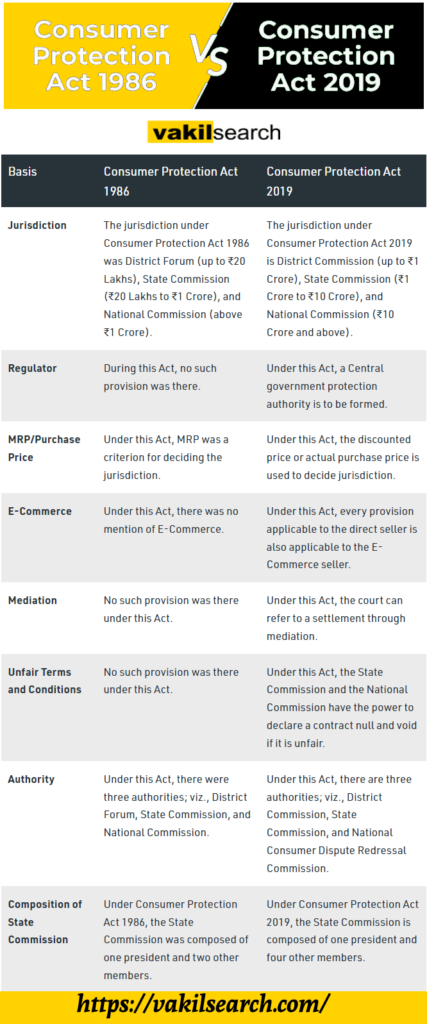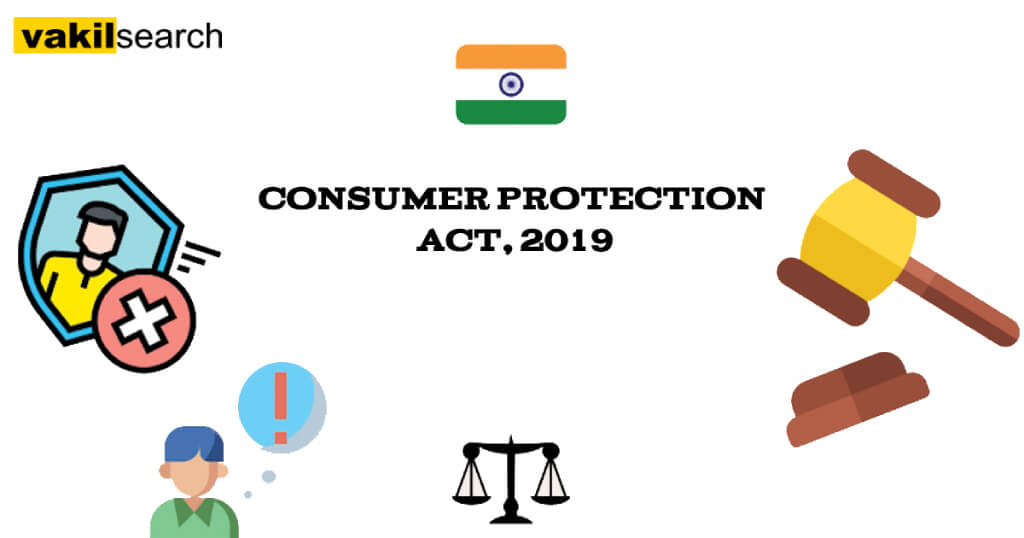The Consumer Protection Act, of 2019, is responsible for enforcing consumer rights in India. This act was introduced to replace the Consumer Protection Act of 1986. Read on to know about consumer protection laws.
One of India’s primary laws protecting customers is the Consumer Protection Act. The Consumer Protection Amendment Act of 2002 was passed in 2002, amending the 1986-introduced law. The Consumer Protection Act 2019 is the latest one. Here, that law is also explained.
With the help of Vakilsearch, you can write the vendor a legal notice if you feel misled by a bad product or a promise made by them.
Did you know?
Every year on March 15, the world celebrates “Consumer Day.”
In this article, we will discuss everything about the Consumer Protection Act 2019 & 1986.
The Objective of the Consumer Protection Act
The Consumer Protection Act’s main goals are to strengthen the consumer protection system and create a robust process for resolving disputes between consumers.
Both the Consumer Protection Act 2019 & 1986 fight for the following rights:
- Prevent the marketing of products that pose a risk to human life or property;
- To protect the consumer from unfair business practices, provide information about the
- Size,
- Number,
- Potency,
- Price of the goods etc
- Whenever possible, guarantee to have access to a source of affordable goods; the interests of consumers will be heard at the proper forums and ensured of receiving due consideration;
- Consumer education; seeking redress against unethical business practices or shady consumer exploitation.
Who is a Consumer?
Anyone who pays money for goods or services is considered a consumer under the Consumer Protection Act.
Also, the consumer only makes use of the products and services with the consent of the seller. The Act includes all goods and services, including those offered by the banking and e-commerce sectors. It also includes telecom, insurance, electricity, and transportation industries in both the public and private sectors.
How & When to Complain?
According to the Consumer Protection Act 2019, a customer may file a written complaint if:
- Any dealer or service provider engaging in a restricted or unfair business activity;
- He purchased or agreed to purchase things that had one or more flaws;
- The services he has contracted for, used, or agreed to use have deficiencies in some way;
- The trader or service provider, as the case may be, has charged more than the price for the goods or services mentioned in the complaint:
- Fixed by or under any currently in effect law; reflected on the price list he displayed by or as required by any law in effect at the time; mutually agreed upon;
- Putting products on the market that, when used, pose a threat to people’s lives and safety.
- Providing services that, if used, pose a risk to the public’s safety and life.
Consumer Protection Act 1986 v/s Consumer Protection Act 2019
Consumer Protection Act 1986
In 1986, the Consumer Protection Act was passed to protect consumers’ interests better. There was no exception to the application of this act to Jammu and Kashmir. Several amendments were made to the Consumer Protection Act 1986 in 2002, and these amendments became effective on 15 March 2003.
Consumer Protection Act 2019
In the Loksabha, the Consumer Protection Bill 2019 was introduced by the minister of food and public distribution and consumer affairs, Mr Ram Vilas Paswan. On 8 July 2019, the bill was introduced. Consumer Protection Act 2019 is designed to protect and promote the interests of consumers by providing them with quick and inexpensive redress of their grievances. It applies to all types of businesses in India, whether they are traders or manufacturers or whether they are supplying goods or providing services (including businesses engaged in e-commerce).

Procedure to File Consumer Case
Consumers must submit any written complaints they may have regarding goods or services to a District Forum along with the required fee. Within 21 days of the complaint’s receipt, the District Forum has the option to accept or reject the claim.
On the other hand, the opposing party will receive a copy of the complaint and have 45 days to approve it. Consumers must submit any written complaints they may have regarding goods or services to a District Forum along with the required fee.
Within 21 days of the complaint’s receipt, the District Forum has the option to accept or reject the claim. On the other hand, the opposing party will receive a copy of the complaint and have 45 days to approve it.
Consumer Protection Act, 2019 Changes
As a result of the 2019 Consumer Protection Act’s passage, the following amendments have been made:
- Where the amount of the commodities, services, or products paid as consideration to the seller does not exceed ₹50 lakh,
- The District Commissions shall have the authority to examine complaints.
- When the price of the goods, services, or products paid as the seller’s consideration is greater than ₹50 lakh. But if it does not exceed ₹2 crore then state commissions shall have the authority to consider complaints.
- When the seller receives payment for goods, services, or products worth more than two crore rupees,
- To hear complaints, the National Commission shall have jurisdiction.
- The Act also mandates that all consumer dispute complaints must be resolved as quickly as possible. If the complaint does not require analysis or testing of the goods and services, the decision on it must be made within three months of the date the other party received notice. And it must be made within five months if such analysis or testing is necessary.
- Consumers can also submit complaints online thanks to the Consumer Protection Act of 2019. For consumers all over India to contact the appropriate consumer forums in the event of a dispute,
- The Central Government established the E-Daakhil Portal, which offers a convenient, quick, and affordable facility.
- The Act specifies the legal parameters for direct sales and digital services.
- The Consumer Protection Act of 2019 establishes mechanisms for alternative dispute resolution.
- The Consumer Protection Act of 2019 includes provisions for product liability and unfair contracts in addition to three additional unfair trade practices.
However, the prior Act only included six classifications of unfair commercial practices. The Act of 2019 serves as the advisory body for the promotion and protection of consumer rights.
Stand up for your rights by applying for a legal notice under the Consumer Protection Act 2019 today.
- Selection committees are not permitted under the Consumer Protection Act 2019 because the Central Government is authorised to appoint the members.
Contact Vakilsearch for further details; their professionals will clear up any questions you may have.
The Indian Parliament therefore passed and put into effect the Consumer Protection Act, 2019 to include regulations for e-commerce because the digital era has made it possible for convenient payment mechanisms. It also provided a range of options, improved services, etc.
Need for the Consumer Protection Act, 2019
The Consumer Protection Act 2019 was enacted to replace the Consumer Protection Act 1986. The new Act was brought in to address the changing needs of consumers and the growing challenges posed by the e-commerce sector.
The Consumer Protection Act, 2019 is a comprehensive law that aims to protect consumers from unfair trade practices and to provide them with easy and effective access to justice.
What are Consumer Rights under Consumer Protection Act, 2019?
The Consumer Protection Act 2019 guarantees the following rights to consumers:
- Right to safety
- Right to be informed
- Right to choose
- Right to a fair hearing
- Right to seek redressal
- Right-to-consumer education
What are Unfair Trade Practices under the Consumer Protection Act, 2019
The Consumer Protection Act 2019 prohibits a wide range of unfair trade practices, including:
- False or misleading advertisements
- Sale of goods or services that are defective or not fit for purpose
- Charging excessive prices
- Refusing to refund money or replace defective goods
- Coercing consumers into buying goods or services
- Using unfair terms and conditions in contracts
Essential Provisions of the Consumer Protection Act, 2019
The Consumer Protection Act 2019 includes a number of essential provisions, such as:
- Establishment of the Central Consumer Protection Authority (CCPA) to investigate and prosecute unfair trade practices
- Establishment of a new three-tier consumer dispute redressal mechanism
- Introduction of product liability regime
- Increased penalties for offences under the Act
Changes Incorporated in Consumer Protection Act, 2019
The Consumer Protection Act 2019 incorporates a number of changes from the Consumer Protection Act 1986, including:
- Wider definition of “consumer” includes online shoppers
- Wider definition of “goods” and “services”
- Introduction of product liability regime
- Increased penalties for offences under the Act
Central Consumer Protection Authority
The Central Consumer Protection Authority (CCPA) is a new body established under the Consumer Protection Act 2019. The CCPA is responsible for investigating and prosecuting unfair trade practices. The CCPA also has the power to recall defective products and issue cease and desist orders.
Consumer Disputes Redressal Commission
The Consumer Protection Act, 2019 establishes a new three-tier consumer dispute redressal mechanism. The three tiers are:
- District Consumer Disputes Redressal Commission (DCDRC)
- State Consumer Disputes Redressal Commission (SCDRC)
- National Consumer Disputes Redressal Commission (NCDRC)
Consumers can file complaints with the DCDRC if the value of their claim is up to ₹1 crore. For claims above ₹1 crore, consumers can file complaints with the SCDRC. Consumers can file appeals against the orders of the DCDRC and SCDRC with the NCDRC.
Product Liability
The Consumer Protection Act 2019 introduces a product liability regime. Under the product liability regime, manufacturers, importers, sellers, and service providers are liable for any injuries or damage caused by defective products.
Offences and Penalties under the Consumer Protection Act 2019
The Consumer Protection Act, 2019 prescribes a number of offences and penalties. For example, the Act prescribes imprisonment for up to five years and a fine of up to ₹50 lakh for the offence of making false or misleading advertisements.
How do Consumers Benefit from Consumer Protection Act, 2019?
The Consumer Protection Act, 2019 benefits consumers in a number of ways, including:
- It provides consumers with comprehensive protection from unfair trade practices.
- It provides consumers with easy and effective access to justice.
- It introduces a product liability regime to hold manufacturers and sellers accountable for defective products.
- It prescribes increased penalties for offences under the Act.
The Consumer Protection Act 2019 is a significant piece of legislation that strengthens the rights of consumers in India.
Conclusion
We hope that after reading this article, one has understood the importance of Consumer Protection Laws.
This Act allows consumers to seek alternative dispute resolution mechanisms and mediation, allowing the parties to choose a quick and effective resolution of consumer disputes. The Act’s inclusion of e-complaints and e-consumers shows that some members of the legislature were forward-thinking.
The Act has added new concepts like “product liability” and “unfair contracts,” broadening the scope of protection for consumers’ rights. It also enables them to complain when those rights have been violated.




